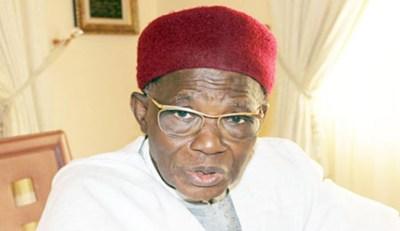Umaru Dikko: Loved and Hated in Equal Measure

Alhaji Umaru Dikko
Ojo M. Maduekwe
The curtain, at last, drew on the life of Alhaji Umaru Dikko, the once colourful, powerful and influential Second Republic politician and former Minister of Transport during the President Shehu Shagari administration.
He passed on yesterday at the age of 78, according to his son, Bello who confirmed that he died in a London hospital, where he had been receiving treatment for some time.
Dikko was reported to have suffered three strokes in a row and remained bed-ridden until his passing.
Dikko would always be remembered for the infamous kidnapping incident in 1984, when the attempt to bundle him back to Nigeria from the United Kingdom in a crate to answer corruption charges were foiled.
Dikko was a major player in the Second Republic political drama. He was virtually the man Friday to Shagari, who was rather pliant and placid in the running of the government.
Although he was just the transport minister, Dikko’s political conduct and aura dominated that of even the vice-president, Dr. Alex Ekwueme.
That explains why Dikko’s visibility spread far beyond the prism and mandate of his transport ministry.
As the Chairman of the Presidential Taskforce on Rice, the scandal that trailed the import licence saga of that government was unsettling. It beamed the spotlight on the government at the time.
In particular, he was said to have embezzled millions of dollars from the nation’s coffers, amounting to about £3.5billion.
That belief may have explained the desperation by the military government of Major-General Muhammadu Buhari, which overthrew the civilian government, to resort to very unorthodox means to bring Dikko home to face trial from the UK.
After his pardon by former military president, General Ibrahim Babangida, Dikko remained passively active in Nigeria politics.
However, before the failed abduction from the UK, Dikko through his utterances stirred the hornet’s nest when he was reported to have said that Nigerians were not as poor as the media had projected them, given the fact that they were not eating from the dustbin. It was an analogy that rankled many Nigerians.
Although Dikko denied making the statement, many people believed that it was the kind of statement he was capable of making, especially as he was trying to dismiss the hue and cry about the hardship caused by the austerity measures of the Shagari administration.
He had began his political career when he got appointed Commissioner in the then North Central State (now Kaduna State) in 1967.
After the 1966 coup that led to the civil war, Dikko was made secretary of a committee set up by General Hassan Katsina to unite the northerners.
Thereafter, in 1979, he was made Shagari’s campaign manager for the presidential campaign of the National Party of Nigeria (NPN), which succeeded in bringing Shagari to power.
He was then rewarded with the transport ministry portfolio after the election.
Dikko’s influence was pervasive in the ruling NPN. His opinions were hardly challenged. He was bold and blunt.
Indeed, the hero of June 12 presidential election, the late Chief MKO Abiola, got a whiff of Dikko’s audacious character. In the run up to the choosing of a presidential candidate for the NPN, Dikko had told Abiola that the presidency was not for sale and that there was “No vacancy in Ribadu Road”, the then seat of power.
That zipped the presidential ambition of Abiola at the time. He stormed out of the NPN in anger and not long after, that the government crumbled. The rest is now history.
As soon as the coup that toppled the Shagari government was announced, many top politicians, including Dikko fled the country through the Nigeria-Seme border into self-exile. With some assistance, Dikko travelled to Togo’s capital, Lome and from there boarded a KLM flight to London via Amsterdam.
He remained in London until 1994 when the military government of General Sani Abacha, a year after seizing power, nominated him as a member of the body that was supposed to return Nigeria to democracy.
Despite his attempt to stay away from the public glare, the ruling Peoples Democratic Party (PDP) last year, under then National Chairman, Bamanga Tukur, controversially approved the composition of a 7-man national disciplinary committee, and appointed Dikko as the head of the committee.
The nomination, which happened while Dikko was abroad receiving treatment, did not go down well with some members of his family who considered him too frail for the job.
The rumour mill was agog that Dikko, then 77 years, would not return for the committee’s inauguration. As a result, King A.J. Turner, his deputy on the committee was to act as chairman in his stead.
However, Dikko still returned against the wishes of his son, Bello, a doctor, and it was reported that his voice was feeble when he spoke at the inauguration.
Source: ThisDay
